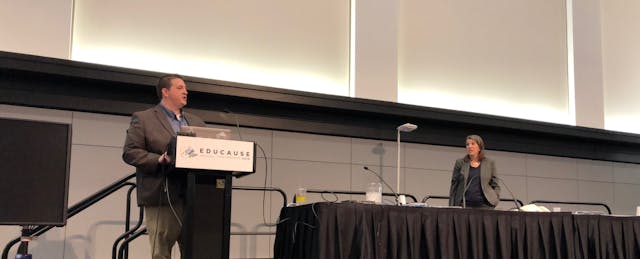How will artificial intelligence and machine learning change teaching? It’s a question that some higher education instructors have asked before, and one that two Penn State University educators sought to answer on Wednesday at this year’s EDUCAUSE conference in Denver.
Jennifer Sparrow, the university’s senior director of teaching and learning with technology, thinks the fears that some faculty have about artificial intelligence taking their jobs echos the concern some had 20 years ago when higher education was first “branching out into online learning.”
However, she and her colleague Kyle Bowen, who is the director of teaching and learning with technology, believe that artificial intelligence and machine learning will supplement the work faculty already do. Specifically, it will help them prepare for and teach their courses through several phases—ideation, design, assessment, facilitation, reflection and research. The two described a few prototypes they’ve built to show what that might look like.
Eureka!
One way professors can use artificial intelligence is to help find new materials to add to their lessons, said Bowen. An instructor can type in a concept or idea, such as “industrial design,” into the tool his team built, called Eureka!, which acts like a recommendation engine. Eureka! uses Wikipedia as a source of information. Once the tool generates results, the instructor can identify which ones are most like what he means by “industrial design” or whichever term he used. Eureka! will then use that information to refine the definition of that original term.
Bowen argues that unlike an internet search, where an instructor would simply change the term she’s searching for if she doesn’t like the results, the instructor is helping the machine learn the subject area, teaching it what she means by a term within the context of her instruction.
BBookX
Sparrow said when she plans her courses, she thinks about the “depth and breath” of the materials she’s going to cover. Artificial intelligence can play a role in that, too.
BBookX uses artificial intelligence to create OER texts for professors to use in their courses instead of traditional textbooks. Bowen said that faculty wouldn’t necessarily publish or deliver to students what BBookX generates, but they can use its results as a starting point to get basic background materials for their classes.
Sparrow thinks a tool like BBookX can be used for personalized learning in the classroom as well—so that perhaps students can craft what their own study materials look like.
Inquizitive
One problem open educational resources present, said Bowen, is that they don’t always come with a bank of quizzes and tests, and professors often have to add such options on their own, which can be time-consuming.
So his team built Inquizitive, a quiz generation engine. If an instructor types in, say, a few paragraphs from a text, the system’s artificial intelligence engine can identify the key concepts in that text. Then, the instructor can identify which phrases or notions she likes.
Bowen thinks this type of tool could nudge professors to look to a range of sources for quiz questions, such as discussion board postings.
‘More Human’
Another idea Bowen and Sparrow are working on right now is how to use AI to evaluate audio recordings of classroom lectures to provide feedback to instructors. That potential application of AI in the classroom, and others, are not intended to replace humans, stressed Sparrow.
“This is about allowing the faculty access to the tools that allow them to be creative, more engaging, have more conversation, and ultimately, be more human.”


